Our Students
Life is hard for all in Kuria and particularly so for girls and women. No one in Kuria would disagree with this statement. From their earliest years, girls will be sent out in the early morning to collect water, often at a distance, and work in the fields and kitchen as soon as they are able. They are at everyone’s beck and call and expected to be obedient and meek.
By the time we come to know them, our students have already broken the mold. They have shown considerable grit and determination. They have persisted through 8 years of primary education and achieved the high grades necessary for admission to secondary education. This is no mean achievement in an area with poor literacy standards and high drop-out rates, with many marrying before they have completed primary school.
It is not altogether surprising that many are now proving high achievers in school and transforming the possibilities of their lives. Given the low educational standards of Kuria, this has been apparent only in recent years. Our first student to qualify and go to University was in 2006/7. Since then the number continuing to university has risen year by year. In 2017 at least 13 of our students had already graduated and 17 more were due to graduate in the next two years. While most have chosen degrees in education, others have followed a wide range of interests, taking degrees in the professions (Law, Medicine, Commerce) but also in Wildlife Management, Computer Science, Building Management, Beauty and Design and others. It is an astonishing flowering of talent.
Of course, a university degree is only one kind of success. Many of our students both now and in the past have gone on to college and qualified as primary school teachers, nurses and social workers. Some of these have returned to Kuria to live and to help develop their society. But education is not only about the high-flyers. The students who marry directly after secondary education bring new levels of understanding and knowledge to their families and neighbourhood. They too play a crucial part in changing the perceptions of women’s abilities and their place in society.
They are all important role models and, as they take their place in the world, they will spearhead many a different future for Kurian women.
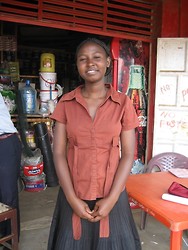
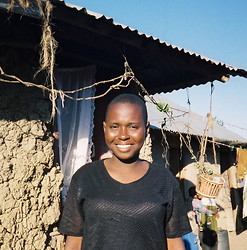
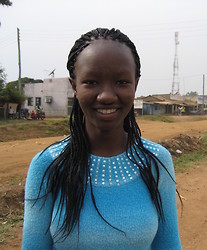
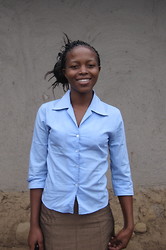
Elizabeth, Catherine, Darlene and Rael in Kuria before leaving for tertiary education
Now, Elizabeth is embarking on a career as a medical nurse, Catherine works as an auditor for the Kenyan Parliament, Darlene works for the Ministry of the Environment and Rael who qualified in social work is employed locally with an NGO.
Our Students' Lives
Ester
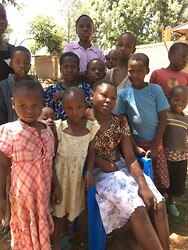
In December 2018 we met Ester, studying in her home in an attempt to catch up with the school work she had missed by having been sent home from school for lack of fees. We arranged to pay her balance so that she could enter Form 4 without such a handicap. She more than fulfilled our expectations and achieved a B+ and was top of our students going to University in 2020. She decided to do a degree in Medical Nursing.
She is pictured here surrounded by her siblings and other neighbouring children.
Evaline
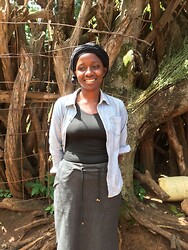
We were very happy to meet Evaline and her family in 2018 when she had just finished Form 4.
She did brilliantly and obtained A- and was therefore one of the top 3000 candidates in the KCSE examinations in Kenya in that year. She explained that she wanted to be a dentist because her mother suffers terrible toothaches. In 2019, she enrolled for a degree in Dental Surgery at Moi University. This was interrupted in 2020 because of Covid – read her account of how she is living during this time here: Evaline
Elizabeth
One of the first students we supported through both school and university where she studied medical nursing. She writes in 2019: Elizabeth
Faith
We supported Faith throughout her schooling and she now works as a Civil Registration Officer. She tells her own story and what she hopes she can do to help TMET here: My Beautiful Journey With Tmet Uk
Justine
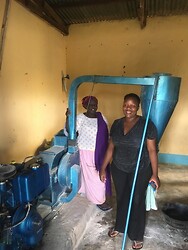
Justine finished Form 4 in 2008 and continued to Teachers Training College. She now teaches English and KiSwahili at a school in Kuria. She lives with her small son and mother. With her savings she bought a posho (maize) mill for her mother so she would have an independent source of income. She and her mother are pictured here with the posho mill.
By the time we come to know them, our students have already broken the mold. They have shown considerable grit and determination. They have persisted through 8 years of primary education and achieved the high grades necessary for admission to secondary education. This is no mean achievement in an area with poor literacy standards and high drop-out rates, with many marrying before they have completed primary school.
It is not altogether surprising that many are now proving high achievers in school and transforming the possibilities of their lives. Given the low educational standards of Kuria, this has been apparent only in recent years. Our first student to qualify and go to University was in 2006/7. Since then the number continuing to university has risen year by year. In 2017 at least 13 of our students had already graduated and 17 more were due to graduate in the next two years. While most have chosen degrees in education, others have followed a wide range of interests, taking degrees in the professions (Law, Medicine, Commerce) but also in Wildlife Management, Computer Science, Building Management, Beauty and Design and others. It is an astonishing flowering of talent.
Of course, a university degree is only one kind of success. Many of our students both now and in the past have gone on to college and qualified as primary school teachers, nurses and social workers. Some of these have returned to Kuria to live and to help develop their society. But education is not only about the high-flyers. The students who marry directly after secondary education bring new levels of understanding and knowledge to their families and neighbourhood. They too play a crucial part in changing the perceptions of women’s abilities and their place in society.
They are all important role models and, as they take their place in the world, they will spearhead many a different future for Kurian women.




Elizabeth, Catherine, Darlene and Rael in Kuria before leaving for tertiary education
Now, Elizabeth is embarking on a career as a medical nurse, Catherine works as an auditor for the Kenyan Parliament, Darlene works for the Ministry of the Environment and Rael who qualified in social work is employed locally with an NGO.
Our Students' Lives
Ester

In December 2018 we met Ester, studying in her home in an attempt to catch up with the school work she had missed by having been sent home from school for lack of fees. We arranged to pay her balance so that she could enter Form 4 without such a handicap. She more than fulfilled our expectations and achieved a B+ and was top of our students going to University in 2020. She decided to do a degree in Medical Nursing.
She is pictured here surrounded by her siblings and other neighbouring children.
Evaline

We were very happy to meet Evaline and her family in 2018 when she had just finished Form 4.
She did brilliantly and obtained A- and was therefore one of the top 3000 candidates in the KCSE examinations in Kenya in that year. She explained that she wanted to be a dentist because her mother suffers terrible toothaches. In 2019, she enrolled for a degree in Dental Surgery at Moi University. This was interrupted in 2020 because of Covid – read her account of how she is living during this time here: Evaline
Elizabeth
One of the first students we supported through both school and university where she studied medical nursing. She writes in 2019: Elizabeth
Faith
We supported Faith throughout her schooling and she now works as a Civil Registration Officer. She tells her own story and what she hopes she can do to help TMET here: My Beautiful Journey With Tmet Uk
Justine

Justine finished Form 4 in 2008 and continued to Teachers Training College. She now teaches English and KiSwahili at a school in Kuria. She lives with her small son and mother. With her savings she bought a posho (maize) mill for her mother so she would have an independent source of income. She and her mother are pictured here with the posho mill.